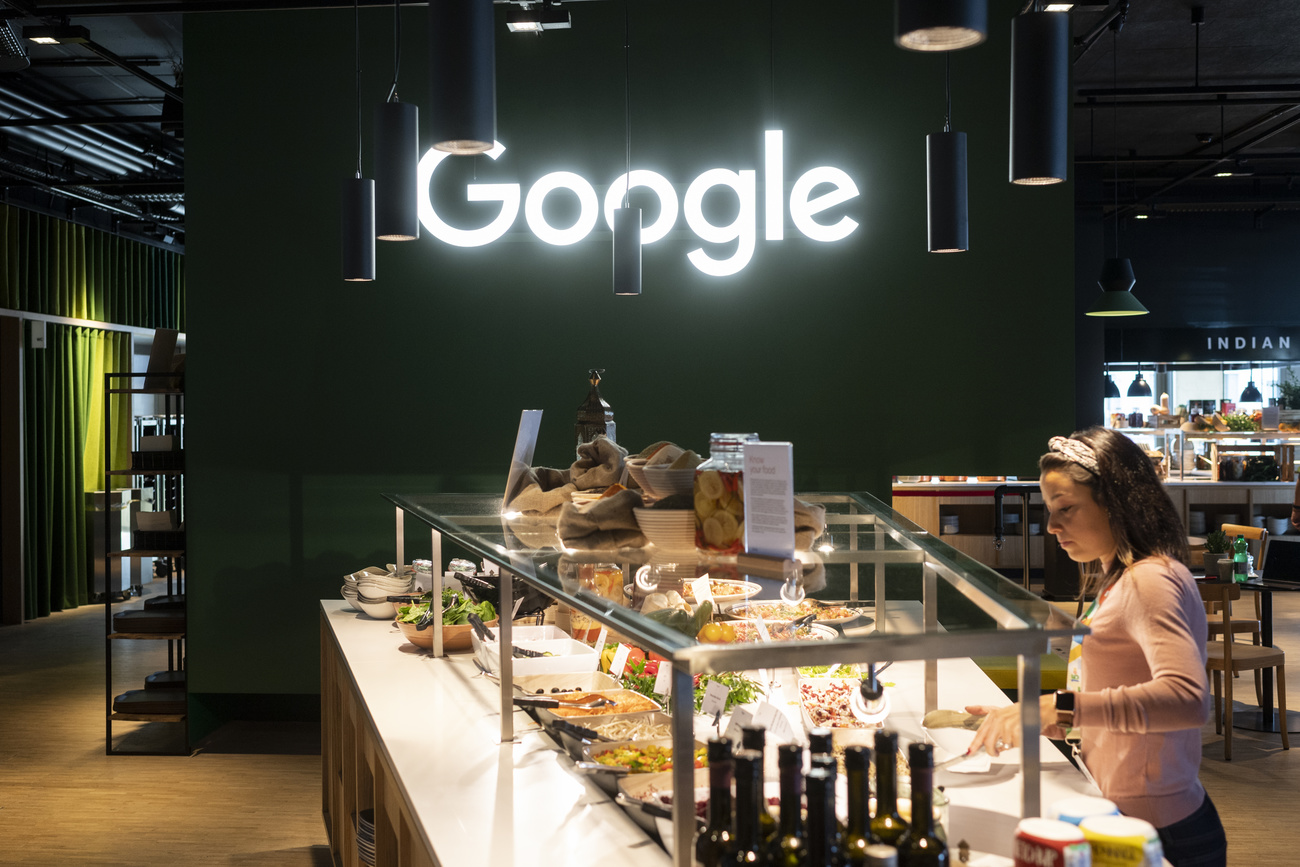
Swiss law faces stress test over employer Covid-19 vaccination mandates

As the Swiss government tries to boost its Covid-19 vaccine campaign amid rising coronavirus infections, questions are being raised about whether employers can legally require workers to get vaccinated. The answer is proving tricky.
When Google announced a few weeks ago that it will require its employees to be vaccinated against Covid-19 to work on-site, Swiss labour rights groups perked up. What would this mean for the more than 4,000 employees at Google’s offices in Zurich?
The internet search giant said it will adapt its policyExternal link, initially introduced in the US, to local conditions in the countries where it has offices. But the announcement has sparked debate about whether such employer vaccine mandates are even allowed under Swiss law.
The answer is both yes and no, according to Lorena Steiner, a lawyer at Battegay and Dürr law firm in Basel.
“The Swiss Epidemics Act is restrained and also appears contradictory when it comes to mandatory vaccination that isn’t enforceable,” Steiner told SWI swissinfo.ch. “Individual rights such as personal freedoms and physical integrity are very important in Switzerland. Even the vaccination obligation according to the Epidemics Act doesn’t allow for coercion.”

More
Health office launches new Covid vaccination campaign
The nuance, says Steiner, is that employers can require specific groups of workers to get vaccinated. Even then, no one can get vaccinated against their will. But which groups of workers and how companies can enforce a mandate have confounded many Swiss legal experts.
What does the law say?
Switzerland’s Labour Act and various ordinances related to the Covid-19 emergency oblige employers to take measures to protect the health of employees.
On top of this is the Code of ObligationsExternal link, which states that private employers are justified in mandating employees get vaccinated in certain circumstances based on the employer’s right to issue instructions to employees.

More
How the Swiss could reverse a dip in Covid vaccinations
Under the Swiss Epidemics Act, revised in 2013, cantons also have the right to impose mandatory vaccination if it is in the interest of public health. But this can only be applied to certain groups of people. The example often given is healthcare workers, as they have regular contact with high-risk individuals. The law also gives the federal government power to mandate vaccination in consultation with cantons, but this has never been done.
The Epidemics Act also states clearly that no one can force another person to be vaccinated against their will.
So, where does this leave companies?
Swiss employers have an obligation to protect the health and safety of employees, but Steiner says wearing a safety helmet or even a hygiene mask is different than vaccination, which is a more “drastic measure” that can’t be undone. Although vaccination is considered the most effective measure against Covid-19, less invasive measures are possible to keep employees safe, such as regular testing.
While many companies in countries like the United States have issued vaccine mandates for entire workforces, this is out of the questionExternal link in Switzerland. An employer, whether public or private, could make a case for mandatory vaccination for all or some healthcare workers based on the legal clause regarding public health interests.
Both the French and Italian governments announced such a measure this summer, with French President Emmanuel Macron telling healthcare personnel that they would be out of a job if not vaccinated by September 15.
If employees refuse, employers are expected to look for another task inside the company for them to do or find another solution for the employee.
The next step is to issue a warning to the employee. “Firing someone because they won’t get vaccinated isn’t the right solution. This should be a last resort,” says Steiner.
In fields outside of healthcare, the situation gets more complicated, as some jobs are becoming increasingly difficult to do without vaccination. For example, any job that includes travel will likely require proof of vaccination. This may make it difficult for an employee to fulfill contractual duties.
The law is unclear on how far companies can go to enforce a mandate. This is especially the case as access to activities or venues becomes more dependent on proof of vaccination.
“The line between coercion and willingness is getting blurry,” as external pressure mounts, Steiner says.
More clarity could be on the way if the Swiss look at the European Court of Human RightsExternal link. It ruled that mandatory vaccination interferes with personal integrity but may be necessary to safeguard public health. It added that refusal of statutory vaccination could be considered a criminal offense but that wasn’t the same as physically forcing someone to get vaccinated.
There is strong pushback against measures that could be perceived as discriminatory against unvaccinated people. In November, Switzerland will vote on a popular initiative that challenges the government’s power to impose restrictions. Supporters claim the Covid-19 certificates issued to people who have been vaccinated, tested, or recovered from the coronavirus are discriminatory.
How are Swiss companies approaching this?
For now, most Swiss companies have followed the federal government’s lead, encouraging vaccination by lowering the barriers to do so instead of mandating it. The federal government has so far said it won’t make vaccination mandatory. Cantons haven’t announced mandatory vaccination for any workers, such as healthcare staff or teachers.
A spokesperson for Basel-based pharmaceutical company Novartis told SWI swissinfo.ch that they continue to recommend associates work from home. Only employees who are fully vaccinated, have fully recovered, or have an up-to-date negative Covid-19 test result, should come to their Basel campus.

More
Covid 19: teachers call for stricter measures for new school year
But Novartis stops short of requiring proof of immunisation or negative test results to enter its offices. “We trust that employees in our offices will follow our rules if they choose to work at the site,” the company spokesperson told SWI swissinfo.ch.
Swiss multinationals may soon be outliers as more companies follow Google’s lead. Several large pharmaceutical companies have announced vaccine requirements for employees, including California-based Gilead Sciences, which announced it would require all employees and contractors to be fully vaccinated against Covid-19External link by October 1. Many banks, such as Goldman Sachs, have also announced similar policies or requiring employees to disclose their vaccination status.
In Switzerland, employees themselves are sometimes forcing institutions’ and companies’ hands. On Wednesday, the German-language newspaper Neue Zürcher ZeitungreportedExternal link that a professor at the University of Basel is refusing to offer in-person lectures if unvaccinated people are allowed in lecture halls, out of concern for himself and other students.

More
Businesses urged to back Swiss Covid-19 vaccination strategy

In compliance with the JTI standards
More: SWI swissinfo.ch certified by the Journalism Trust Initiative





























You can find an overview of ongoing debates with our journalists here . Please join us!
If you want to start a conversation about a topic raised in this article or want to report factual errors, email us at english@swissinfo.ch.